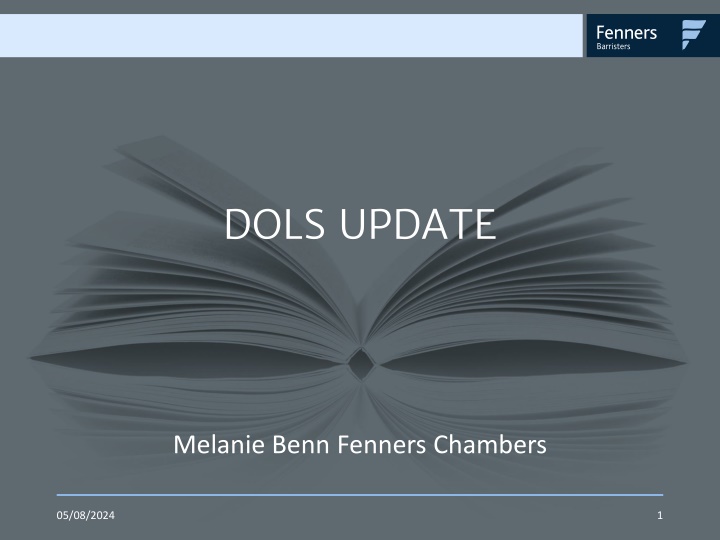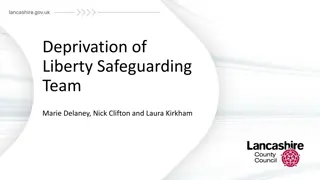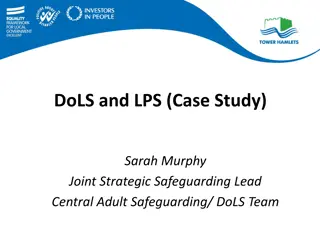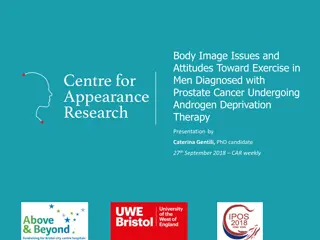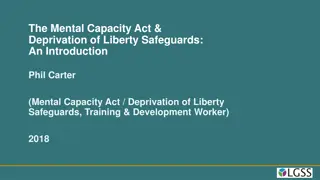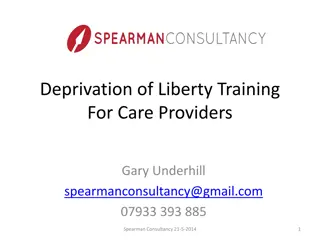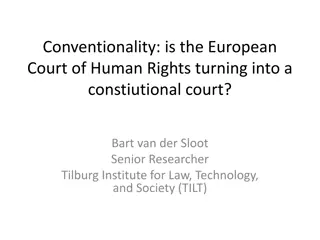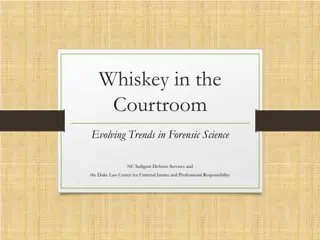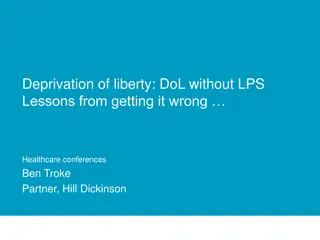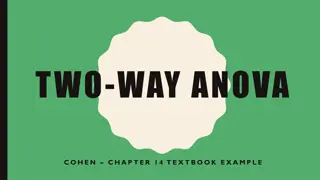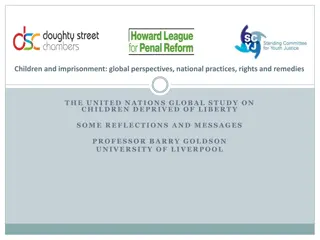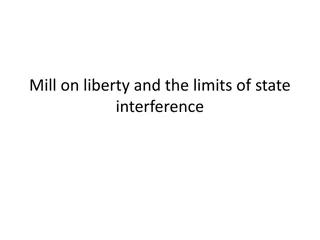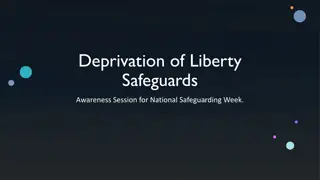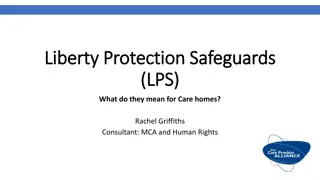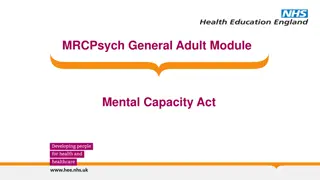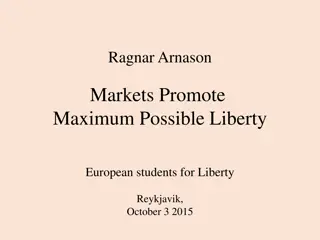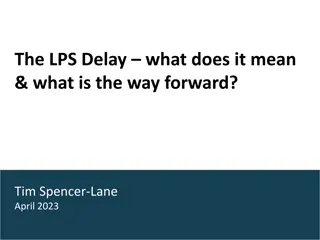Overview of National Deprivation of Liberty (DoLs) Court Data
The National Deprivation of Liberty (DoLs) Court, launched in July 2022 at the Royal Courts of Justice, has recorded a total of 903 applications between July 2022 and February 2023. The court deals with authorization applications for depriving children of their liberty. Regional variations in application numbers are observed, with the majority of children aged 15 and above. The court follows best practices and safeguards for placements in unregistered children's homes.
Download Presentation

Please find below an Image/Link to download the presentation.
The content on the website is provided AS IS for your information and personal use only. It may not be sold, licensed, or shared on other websites without obtaining consent from the author.If you encounter any issues during the download, it is possible that the publisher has removed the file from their server.
You are allowed to download the files provided on this website for personal or commercial use, subject to the condition that they are used lawfully. All files are the property of their respective owners.
The content on the website is provided AS IS for your information and personal use only. It may not be sold, licensed, or shared on other websites without obtaining consent from the author.
E N D
Presentation Transcript
DOLS UPDATE Melanie Benn Fenners Chambers 05/08/2024 1
Launch of National Deprivation of Liberty (DoLs) Court at the Royal Courts of Justice 4 July 2022 The National DoLs (Deprivation of Liberty) court launched on 4 July 2022. The court deals with applications seeking authorisation to deprive children of their liberty and is based at the Royal Courts of Justice under the leadership of Mr Justice Moor. From 4 July 2022, all new applications seeking these orders are issued in the Royal Courts of Justice (RCJ). The new court is supported by two Family High Court/deputy high court judges each week and an administrative team based in the RCJ. Cases will either be retained for hearing within the National DoLs Court or will be returned to circuit, based on agreed criteria. 05/08/2024 2
HOW MANY APPLICATIONS HAVE THERE BEEN? Between July 2022 and February 2023, the national DoL court recorded a total of 903 applications. In some cases, a repeat application is issued within the same case for example, to extend an existing order or to vary the current order (e.g. if the child moves placement or additional restrictions on their liberty are sought). So far, there have been 54 repeat applications. This means that a total of 854 children have been subject to DoL applications at the national DoL court since 4 July (including a very small number of applications for sibling groups). 05/08/2024 3
On average, there have been 113 applications per month, with the highest number of applications issued in August (131 applications). In the most recent month, February 2023, there were 106 applications. The applications were made by 143 different local authorities and 13 hospital or mental health trusts. Those issued by hospital trusts are usually to authorise restrictions of children s liberty in hospital when the child may not be in the care of the local authority, or where the local authority is also a party in the case Between July 2022 and February 2023, just over a fifth (21.8%) of all applications were made by local authorities in the North West of England, followed by 16.6% of applications from local authorities in London. Local authorities in the North East have made the fewest number of applications (3.8% of the total). This pattern of regional variation has broadly remained the same since July. 05/08/2024 4
The majority of children (58.9%) involved in applications were aged 15 and above, with a small minority relating to children under the age of 13 (8.7%). The number of boys and girls involved in the applications has remained almost equal throughout the period of the review. https://www.nuffieldfjo.org.uk/resource/national-deprivation-of-liberty-court-latest- data-trends-february-2023 05/08/2024 5
Presidential guidance: Placements in unregistered childrens homes Key features on best practice safeguards forming part of the UKSC s rationale in ReT: Court to be informed of registration status of proposed placement and steps taken to confirm/check If a placement is unregistered is registration required? If registration is required - The court will wish to assure itself the provider of the service has confirmed they can meet the needs of the child. In addition, the court will need to be informed by the local authority of the steps the local authority is taking in the meantime to assure itself that the premises, those working at the premises and the care being given are safe and suitable for the accommodated child. Where an application for registration has been submitted to Ofsted or CIW, the court should be made aware of the exact status of that application. Macfarlane P, 12 November 2019 https://www.judiciary.uk/guidance-and-resources/practice-guidance-placements-in-unregistered- childrens-homes-in-england-or-unregistered-care-home-services-in-wales-2/ https://www.judiciary.uk/guidance-and-resources/addendum-to-practice-guidance-placements-in- unregistered-childrens-homes-in-england-or-unregistered-care-home-services-in-wales/ 05/08/2024 6
DECISIONS IN DOLS CASES - Where the timescales for registration set out in the President s Guidance cannot be met: - whilst accepting that an unwillingness or inability on the part of a placement to comply with the terms of the President s Practice Guidance is a factor that informs the overall best interests evaluation on an application under the inherent jurisdiction, and that each case will turn on its own facts, I am satisfied that that the court should not ordinarily countenance the exercise the inherent jurisdiction where an unregistered placement makes clear that it will not or cannot comply with the requirement of the Practice Guidance to apply expeditiously for registration as mandated by law. per Cobb J at para 94 - Derby City Council & others v BA & others [2021] EWHC 2931 (Fam) 05/08/2024 7
LA MUST ENSURE THAT ANY PLACEMENT SOUGHT FOR PURPOSES OF A DOL ORDER MEETS THE CHILD S NEEDS HUMAN RIGHTS CLAIMS CAN ENSUE OTHERWISE The case involved a 14 year old child with a diagnosis of Autistic Spectrum Disorder, moderate learning disability and challenging behaviour which included physical violence and damaging property. She also had a history of absconding behaviour, making determined efforts to run away. The NHS Trust responsible for her care made a DOLS application. There was no issue that she was subject to a deprivation of her liberty on the ward which had a locked door and she was supervised on a 4:1 basis. Prior to the matter coming before Mr Justice MacDonald there had been no DOLS application. The child lacked capacity The question was: is it in the child s best interests to be deprived of her liberty at the hospital authorised by the Court? 05/08/2024 8
Held: His Lordship decided that he could not conclude that was in her best interests to authorise the deprivation of her liberty in terms of the regime that was being applied to her on the hospital ward. His Lordship could not conclude that it was in the best interest of a 14 - year old child with a diagnosis of Autistic Spectrum Disorder, and moderate learning disability, to be subject to a regime that included regular physical restraint by multiple adults, the identity of whom changed from day to day under a rolling commercial contract. His Lordship could not conclude that it was in the child s best interests for the distress and fear consequent upon her current regime to be played out in view of members of the public, doctors, nurses and others. His Lordship could not conclude that it was in her best interests to be subject to a regime whose only benefit was to provide her with a place to be, beyond which none of her considerable and complex needs were being met, to any extent, and which, positively harmful to her. THE CURRENT REGIME WAS BRUTAL AND ABUSIVE TO HER 05/08/2024 9
Court was satisfied that not even the necessity of keeping her safe in circumstances, where no alternative placement was available, could justify such authorisation, because it simply could not be said that the placement she was in currently, was keeping her safe. HER NEEDS WERE NOT BEING MET ON THE WARD She had Autistic Spectrum Disorder and has a learning disability. The current placement was a general paediatric ward. It was not equipped to manage the behaviours exhibited by her and was never designed to do so. It was not equipped to provide her with the support that she required, nor with the privacy that she was entitled to, whilst being cared for. 05/08/2024 10
The LA applied for an ICO in the face of the Court. COURT WAS CRITICAL OF THE POSITION OF THE TRUST AND THE LA At paragraphs 43- 46, His Lordship said that the LA has been aware for approximately a month, that the child was in a placement that was manifestly ill equipped to meet her needs, and which it was depriving her of her liberty for the purposes of Art 5 of the ECHR. Also, the NHS Trust acknowledged that the child had been deprived of her liberty in extremely challenging situations for over a month before the matter was brought before the court. Neither the LA, nor the NHS Trust, had taken any steps to seek to bring the matter before the court in a timely manner to seek authorisation for the consequent breach of the child s Art 5 rights. THERE WOULD BE EXAMINATION OF A POSSIBLE HUMAN RIGHTS CLAIM ON BEHALF OF THE CHILD https://caselaw.nationalarchives.gov.uk/ewhc/fam/2022/719 NHS Trust v ST (Refusal of Deprivation of Liberty Order) 2022 EWHC 719 (Fam) 05/08/2024 11
DOES RESTRICTING ACCESS TO A MOBILE PHONE FALL WITHIN DEPRIVATION OF LIBERTY OR THE EXERCISE OF PARENTAL RESPONSIBILITY? Manchester City Council v P (Refusal of restrictions on Mobile phone) On the facts of this case, P is 16 and vulnerable. She functions at the age of a 7 year old. She had a lot of periods of going missing and during those periods became the victim of Child Sexual Exploitation and sadly had a history of self-harming. The Local Authority were asking the Court for permission for an arrangement that allowed them to withhold P s mobile phone from her from 10pm at night to 8am, and for staff to be able to confiscate her mobile phone if her behaviour was escalating. The legal debate in the case was as to whether those sort of restrictions on the use of a mobile phone were a deprivation of liberty, which have to be sanctioned by a Court, or whether the Local Authority were exercising Parental Responsibility. Both the Local Authority and the Guardian in this case were saying that the confiscation of the phone was a restriction of liberty and thus needed Court sanction. There is a comprehensive discussion within the judgement of the principals to be applied by the Court in making decisions involving deprivation of liberty which are too lengthy to set out her.e The judgement can be found here in full: https://www.bailii.org/ew/cases/EWHC/Fam/2023/133.html 05/08/2024 12
Article 5 issues 45. I recognise that for P, in common with many other young people of her age, her mobile phone and other devices constitute a powerful analogue for freedom, particularly in circumstances where she is at present confined physically to her placement. Within this context, I accept that the possession and use of her mobile phone, tablet and laptop, and her concomitant access to social media, is likely to equate in P s mind to liberty broadly defined as the state or condition of being free. However, this court is concerned with the meaning of liberty under Art 5(1) of the ECHR. Whilst I recognise that the Convention is a living instrument, which must be interpreted in the light of present-day conditions (see Tyrer v United Kingdom (1978) 2 EHRR 1 at [31]), over an extended period of time the Commission and the ECtHR have repeatedly made clear that Art 5(1) is concerned with individual liberty in its classic sense of the physical liberty of the person, with its aim being to ensure that no one is dispossessed of their physical liberty in an arbitrary fashion. The Supreme Court proceeded on that formulation of the proper scope of Art 5(1) in Cheshire West. . 05/08/2024 13
46. Within the foregoing context, in my judgment the removal of, or the placing of restrictions on the use of, P s mobile phone, tablet and laptop and her use of social media do not by themselves amount to a restriction of her liberty for the purposes of Art 5(1). On the evidence currently before the court those restrictions do not act to deprive P of her physical liberty, but rather act to restrict her communication, so as to ensure her physical and emotional safety. The evidence set out earlier In this judgment demonstrates that the effect of those restrictions is to limit P s communications with peers who might encourage her to engage in bad behaviour, with strangers who may present a risk to her and with family and friends when she is in a heightened emotional state. Within this context, the restrictions on the use of P s devices for which the local authority seek authorisation do not, in my judgment, by themselves constitute an objective component of confinement of P in a particular restricted place for a not negligible length of time. In the circumstances, whilst they are steps at times taken without P s consent and are imputable to the State, those restrictions do not, by themselves, meet the first Storck criterion [here in red and set out in full at paragraph 37] 05/08/2024 14
Decision of Mr Justice MacDonald: 69. In the circumstances, and for the reasons I have given, I refuse to sanction the removal of, or the restriction of the use of P s mobile phone, tablet and laptop and her access to social media by way of an order authorising the deprivation of her liberty for the purposes of Art 5(1) of the ECHR. I shall instead, make a declaration that it is lawful for the local authority to impose such restrictions in this regard as are recorded in the order in the exercise of the power conferred on it by s.33(3)(b) of the Children Act 1989. Whilst I am satisfied that, were the evidence to justify it, it would be open to the court to grant an order under its inherent jurisdiction authorising the use of restraint or other force in order remove P s mobile phone, tablet and laptop from her if she refused to surrender them to concurrently before the court does not justify such an order being made. Finally, I am satisfied that the other restrictions sought by the local authority do constitute a deprivation of liberty for the purposes of Art 5(1) and that it is ifiscation, the evidence n P s best interests to authorise that deprivation of liberty. I shall make an order in the terms of the order appended to this judgment. 70. Dicey considered the right to liberty to be one of the general principles of the Constitution (see Dicey, A V An Introduction to the Study of the Law of the Constitution (1885) 9th edn, MacMillan 1945, p 19). In R v Secretary of State for the Home Department ex p Cheblak [1991] 1 WLR 890, Lord Donaldson observed that We have all been brought up to believe, and do believe, that the liberty of the citizen under the law is the most fundamental of all freedoms. Within this context, it essential that the State adhere to the rule of law when acting to deprive a child of his or her liberty. This will extend to ensuring that an order lawfully depriving a child of his or her liberty does not act also to deprive that child of other cardinal rights without there being in place proper justification for such interference by reference to the specific content of those other rights. 05/08/2024 15
71.Each case will fall to be determined on its own facts. However, I venture to suggest that it will not ordinarily be appropriate to authorise restrictions on phones and other electronic devices within a DOLS order authorising the deprivation of the child s liberty. Further, it is to be anticipated that, in very many cases, any restrictions on the use of phones and other devices that are required to safeguard and promote the child s welfare will fall properly to be dealt with by the local authority under the power conferred on it by s.33(3)(b) of the Children Act 1989. Only in a small number of cases should it be necessary to have recourse to an order under the inherent jurisdiction, separate from the order authorising the deprivation of liberty, authorising more draconian steps to restrict the child s use of a mobile phone or other device and only then where there is cogent evidence that the child is likely to suffer significant harm if an order under the inherent jurisdiction in that regard were not to be made. 05/08/2024 16
DRAFT ORDER AVAILABLE A precedent order (February 18 2022) is available at https://www.judiciary.uk/guidance-and-resources/message-from-mr-justice-mostyn- standard-orders-2/ You may also wish to listen to this File On Four programme which looks at the more political issues in respect of children s residential placements. You may want to bring the current situation up with your MP! https://www.bbc.co.uk/programmes/m00057ng 05/08/2024 17
